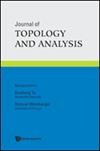之字形持久模的派生范畴的代数稳定性定理
IF 0.4
3区 数学
Q3 MATHEMATICS
引用次数: 0
摘要
从派生范畴和Auslander-Reiten抖动的角度研究了锯齿形持久模的距离。普通持久化模块的派生类别等价于任意之字形持久化模块的派生类别,这取决于经典的倾斜模块。通过这个导出的等价,我们定义并计算了任意之字形持久模的导出范畴上的距离,并证明了一个代数稳定性定理。我们还将我们的距离与Botnan-Lesnick引入的纯之形持久模块的距离以及由Kashiwara-Schapira引起的束理论卷积距离进行了比较。本文章由计算机程序翻译,如有差异,请以英文原文为准。
Algebraic stability theorem for derived categories of zigzag persistence modules
We study distances on zigzag persistence modules from the viewpoint of derived categories and Auslander–Reiten quivers. The derived category of ordinary persistence modules is derived equivalent to that of arbitrary zigzag persistence modules, depending on a classical tilting module. Through this derived equivalence, we define and compute distances on the derived category of arbitrary zigzag persistence modules and prove an algebraic stability theorem. We also compare our distance with the distance for purely zigzag persistence modules introduced by Botnan–Lesnick and the sheaf-theoretic convolution distance due to Kashiwara–Schapira.
求助全文
通过发布文献求助,成功后即可免费获取论文全文。
去求助
来源期刊

Journal of Topology and Analysis
MATHEMATICS-
CiteScore
1.50
自引率
0.00%
发文量
13
审稿时长
>12 weeks
期刊介绍:
This journal is devoted to topology and analysis, broadly defined to include, for instance, differential geometry, geometric topology, geometric analysis, geometric group theory, index theory, noncommutative geometry, and aspects of probability on discrete structures, and geometry of Banach spaces. We welcome all excellent papers that have a geometric and/or analytic flavor that fosters the interactions between these fields. Papers published in this journal should break new ground or represent definitive progress on problems of current interest. On rare occasion, we will also accept survey papers.
 求助内容:
求助内容: 应助结果提醒方式:
应助结果提醒方式:


